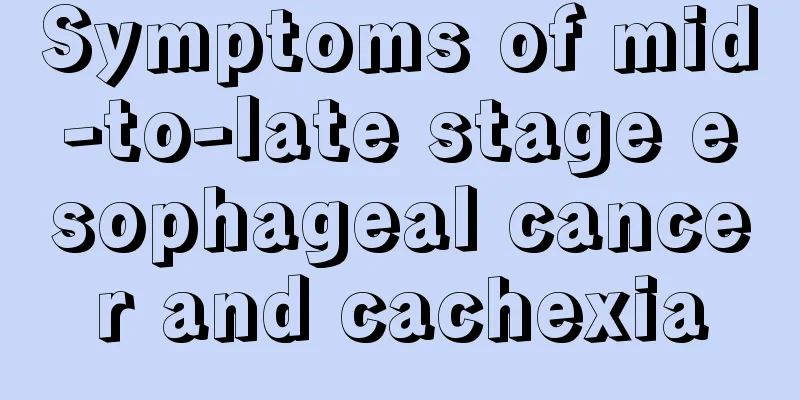Symptoms of mid-to-late stage esophageal cancer and cachexia

|
Research has found that patients in the middle and late stages of esophageal cancer experience difficulty swallowing, cannot swallow solid food smoothly, or swallow it after washing it with soup, and then have difficulty swallowing semi-liquid food. Finally, they also have difficulty swallowing liquid food, followed by chest pain or back pain, esophageal cancer, late stage esophageal cancer, esophageal cancer symptoms... Symptoms of advanced esophageal cancer and cachexia: Studies have found that patients in the middle and late stages of esophageal cancer experience difficulty swallowing, cannot swallow solid food smoothly, or swallow it after washing it with soup, and then have difficulty swallowing semi-liquid food. Finally, they have difficulty swallowing liquid food, followed by chest pain or back pain, vomiting mucus, and lumps in the neck and clavicle. When the tumor directly invades or metastases compress the recurrent laryngeal nerve, vocal cord paralysis occurs, leading to hoarseness, bleeding, shortness of breath, and dry cough. In addition, when widespread cancer cell metastasis occurs throughout the body, it can induce symptoms such as jaundice, ascites, abnormal liver function, dyspnea, cough, headache, coma, etc. In severe cases, esophageal obstruction or complete obstruction may occur, leading to systemic failure. Therefore, early detection, early diagnosis, and early treatment are the key to treating esophageal cancer. To improve the early detection and diagnosis of esophageal cancer, it is necessary to popularize the knowledge of esophageal cancer among the general population, and to conduct examinations at least once a year for high-risk groups, and once every three months for those with high-risk symptoms. Examination methods include esophageal cytology, esophageal X-ray examination, esophagoscopy, serological examination including carcinoembryonic antigen and squamous cell carcinoma antigen, etc., among which esophagoscopy is particularly important. Esophageal cancer is a malignant tumor that occurs in the esophageal epithelial tissue, accounting for 2% of all malignant tumors. About 200,000 people die of esophageal cancer every year worldwide. my country is a high-incidence area for esophageal cancer, and the number of deaths due to esophageal cancer ranks second only to gastric cancer. Most people are over 40 years old, and there are more males than females. However, in recent years, there has been an increasing trend in the number of people under 40 years old. The occurrence of esophageal cancer is related to chronic stimulation by nitrosamines, inflammation and trauma, genetic factors, and the content of trace elements in drinking water, food and vegetables. The Hospital's Traditional Chinese Medicine Tumor Research and Treatment Center specializes in the treatment of esophageal cancer, gastric cancer, liver cancer, and lung cancer. Related information on the treatment of esophageal cancer with traditional Chinese medicine: The Esophageal Cancer Research Institute, the Traditional Chinese Medicine Tumor Research and Treatment Center of Henan Modern Medical Research Institute Hospital, and the Traditional Chinese Medicine Esophageal Cancer Treatment Center are scientific research and clinical institutions that specialize in the research and treatment of esophageal cancer, cardia cancer, and gastric cancer. It is composed of more than 30 well-known tumor experts. After years of dedicated research and clinical trials, they have jointly developed a series of special anti-cancer pure Chinese medicines. The "three-in-one therapy" is mainly used to treat different symptoms caused by esophageal cancer, cardia cancer, and gastric cancer, such as choking and regurgitation of food, continuous sticky phlegm, vomiting after eating, regurgitation of food, difficulty in swallowing, weight loss, hoarseness, chest tightness, fatigue, and reflex pain of lesions. It has good results. The above is all we have to say about the manifestations of esophageal cancer in the middle and late stages and cachexia. If you need to know more, please call our expert consultation hotline or consult our online experts. Esophageal cancer http://www..com.cn/zhongliu/sda/ |
<<: Early clinical manifestations of esophageal cancer
>>: What are the early symptoms of esophageal cancer?
Recommend
What are the differences between a normal chest X-ray and an abnormal chest X-ray?
From a clinical perspective, some patients with l...
How to get rid of the aftereffects of red wine
The aftereffects of red wine can cause dizziness ...
How to wash oil stains on clothes
Now that the weather is getting cooler in autumn,...
Can bronchitis be cured?
In modern society, bronchitis is a disease with a...
What should I pay attention to after laser hair removal?
Laser hair removal is a very popular modern hair ...
What is the function of acid-alkali cleaning agent
Acid-base cleaners are mainly used to dissolve di...
Can I eat very hot food if my throat is inflamed
Throat inflammation is usually caused by overuse ...
Early symptoms of syphilis
As society becomes more and more open, relationsh...
Are there any benefits for women drinking tiger bone wine?
Tiger bone wine is very common in the Northeast. ...
Will thyroid cancer affect life expectancy?
Thyroid cancer is a common endocrine tumor in cli...
What kind of underwear should people with small breasts wear
For a woman's body, the breasts are a relativ...
The nail of the index finger is sunken
The condition of our nails tells a lot about our ...
What symptoms will appear in the late stage of lung cancer?
The symptoms of advanced lung cancer include two ...
What's wrong with the pins and needles in my toes?
The toes have the strongest bearing capacity in t...
Does a flat T wave need treatment?
Heart rate is a must-check item in the physical e...









